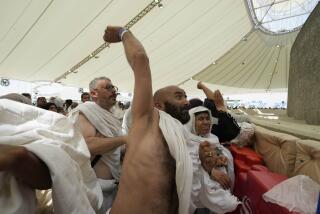Saudis Flock to Pledge Loyalty in a Ritual Fit for a New King
- Share via
RIYADH, Saudi Arabia — They came in droves through the stifling desert heat and waited for hours in jostling crowds to shake the hand of their new king and give their time-honored vows of loyalty. There were tribesmen, princes and sheiks, old men on canes and little boys clutching their fathers’ hands.
King Abdullah emerged in the eyes of his people as this oil-rich kingdom’s ruler Wednesday by carrying out the traditional Islamic rite of Saudi kings: He stood for hours in a sprawling marble hall in the capital, collecting pledges that verbally sealed the social contract between the monarch and his people.
“I express my allegiance to you,” the men told the king. “I hear and obey, except in what would disobey God.”
Some saluted; others kissed the king’s right shoulder. Only members of the royal family are allowed to kiss the royal hand.
“If we had to do it every day, we’d do it,” said Hafez Medlej, a 36-year-old soccer player. “We believe in our leaders, and we come to give them support and loyalty. This is the least thing we can do.”
The ritual of bayah has its roots in the Islamic tradition that was born in Saudi Arabia, when the caliphs who followed the prophet Muhammad collected similar promises of support from the community. It is also derived from the rigid tribal codes that evolved as generations of families banded together to survive in this inhospitable landscape.
“I promise God and you that I will adopt the Koran as the constitution and Islam as the course and that all my concerns will be to establish righteousness and justice, and serve all the people without discrimination,” King Abdullah said in his first speech to his people as the nation’s official leader. “I appeal to you to support me and help me carry this trust. Don’t hesitate to advise me.”
In Wednesday’s ritual, the citizens formally accepted the king as their ruler. They promised loyalty and obedience, but only on the condition that he wouldn’t transgress the laws of Islam. In exchange, the king pledged to protect them.
“We say, ‘We’re supporting you, we’re with you, and you’re government all the way,’ ” Adel Melayhi, 46, said to an American reporter. “In your country you have elections. We don’t have, so we do this.”
Melayhi brought his 13-year-old son to pledge allegiance first to the king and later to the governor of Riyadh. His own father and grandfather had been giving their vows of loyalty to the House of Saud since the kingdom was founded, he said.
“He won’t forget in his life that one day he went to shake hands with the king and princes,” Melayhi said, smiling down at his son. “This is something I’m very proud of.”
The same ceremony was carried out across the country Wednesday. Saudis who lived in outlying provinces were instructed to give their oaths to local governors rather than clogging Riyadh. The governors are considered representatives of the king’s authority, a tradition that began in the days before cars and airplanes became commonplace in Saudi Arabia.
A stream of foreign dignitaries continued to pour into Saudi Arabia on Wednesday with messages of condolence for the royal family.
King Fahd, Abdullah’s half brother, died Monday after 23 years as monarch. But the mood of mourning was hardly perceptible. Fahd had been ailing for a decade, and Abdullah had served as the nation’s de facto ruler as a result. Since Fahd’s death, Saudi officials have repeatedly mentioned the importance of continuity.
Men arrived in Mercedeses and BMWs to Wednesday’s ceremony, and the king and princes stayed in air-conditioned salons. Guards armed with automatic weapons kept watch over the bayah, their chests looped with bullets. But for all of the modern trappings, the ceremony was weighted with a sense of history and of continuity.
“At times when shouldering this responsibility, when I feel the weight is too heavy and the trust too great, I will derive help from God,” King Abdullah said in his speech, which was broadcast on state television.
“I ask him to give me strength to continue the march begun by the founder of the kingdom of Saudi Arabia, the great Abdulaziz al Saud, and then his sons.”
More to Read
Sign up for Essential California
The most important California stories and recommendations in your inbox every morning.
You may occasionally receive promotional content from the Los Angeles Times.













